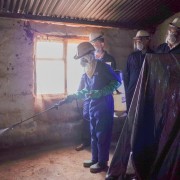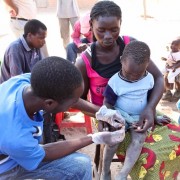Speeches Shim

Zambia is a member of the Scaling Up Nutrition (SUN) global network to end malnutrition, focused on improving nutrition and quality of life for its children. Good nutrition is fundamental for children’s growth and development; however, due to chronic malnutrition, 35 percent of Zambian children under age five are stunted.

With an HIV prevalence rate of 12 percent, Zambia receives significant support from USAID under the U.S. President’s Emergency Plan for AIDS Relief (PEPFAR). These PEPFAR investments focus on scaling up integrated HIV prevention, care, and treatment programs with the goal of reaching epidemic control by 2020. USAID’s District Coverage of Health Services (USAID DISCOVER-Health) project partners with Zambia’s Ministry of Health to implement HIV prevention and treatment, family planning, and maternal and child health programs.

Despite steady advances in the fight against malaria over the last decade, The World Health Organization’s 2018 World Malaria Report indicated that between 2017 and 2018, the global number of malaria deaths remained the same. In Zambia, thanks to the collaborative efforts of the U.S. Government and Zambia’s Ministry of Health, malaria deaths continue to decline. In order to maintain and accelerate progress, the President’s Malaria Initiative (PMI) VectorLink project supports the planning and implementation of Indoor Residual Spraying (IRS) programs and other proven, life-saving vector-control initiatives.
According to the 2014 Zambia Demographic and Health Survey, 43 percent of women aged 15-49 years have experienced some form of physical violence in their lifetime. In close partnership with the Government of Zambia (GRZ), the USAID STOP Gender-Based Violence (GBV) project uses a multi-sectoral approach to help prevent GBV. The USAID STOP GBV projects uses community mobilization programs that promote gender norms change, strengthens the capacity of local systems to respond to GBV, and supports one-stop GBV response care.

Despite steady global advances in the fight against malaria over the last decade, The World Health Organization’s 2018 World Malaria Report indicated that between 2017 and 2018, the global number of malaria deaths remained the same.
In Zambia, thanks to the collaboration between the United States and Zambian governments, malaria deaths continue to decline. In order to maintain and accelerate progress, with support from the United States’ President’s Malaria Initiative, the Impact Malaria (IM) program contributes to work toward the reduction of malaria morbidity and mortality, while moving Zambia towards national or subnational pre-elimination.

Comment
Make a general inquiry or suggest an improvement.